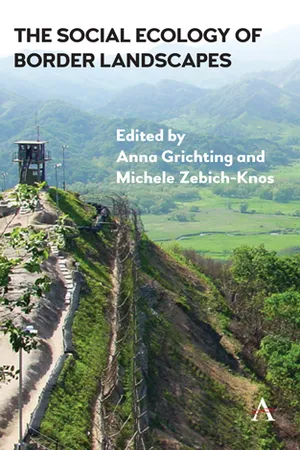
The Social Ecology of Border Landscapes
- 276 pages
- English
- ePUB (mobile friendly)
- Available on iOS & Android
The Social Ecology of Border Landscapes
About this book
The collection of essays in The Social Ecology of Border Landscapes defi nes borders and borderlands to include territorial interfaces, marginal spaces (physical, sociological and psychological) and human consciousness. From theoretical and conceptual presentations on social ecology and its agencies and representations, to case studies and concrete projects and initiatives, the contributing authors uncover a thread of contemporary thought and action on this important emerging fi eld. The essays aim to defi ne the territories of social ecology, to investigate how social agencies can activate ecological processes and systems, and to understand how the interactions of people and ecosystems can create new sustainable landscapes across tangible and intangible territorial rifts.
Frequently asked questions
- Essential is ideal for learners and professionals who enjoy exploring a wide range of subjects. Access the Essential Library with 800,000+ trusted titles and best-sellers across business, personal growth, and the humanities. Includes unlimited reading time and Standard Read Aloud voice.
- Complete: Perfect for advanced learners and researchers needing full, unrestricted access. Unlock 1.4M+ books across hundreds of subjects, including academic and specialized titles. The Complete Plan also includes advanced features like Premium Read Aloud and Research Assistant.
Please note we cannot support devices running on iOS 13 and Android 7 or earlier. Learn more about using the app.
Information
Table of contents
- Cover
- Half Title
- Series Information
- Title Page
- Copyright Page
- Contents
- List of illustrations
- Preface
- Introduction Social Ecologies And Borderlands
- Part I Frames: mapping social ecologies in border territories
- Part II bridges: Resilience, Restoration And Reclamation
- Part III corridors: Catalysts and Collaboration in Confined Spaces
- Part IV Portals: Dialogue, Exception and Reterritorialization
- Index